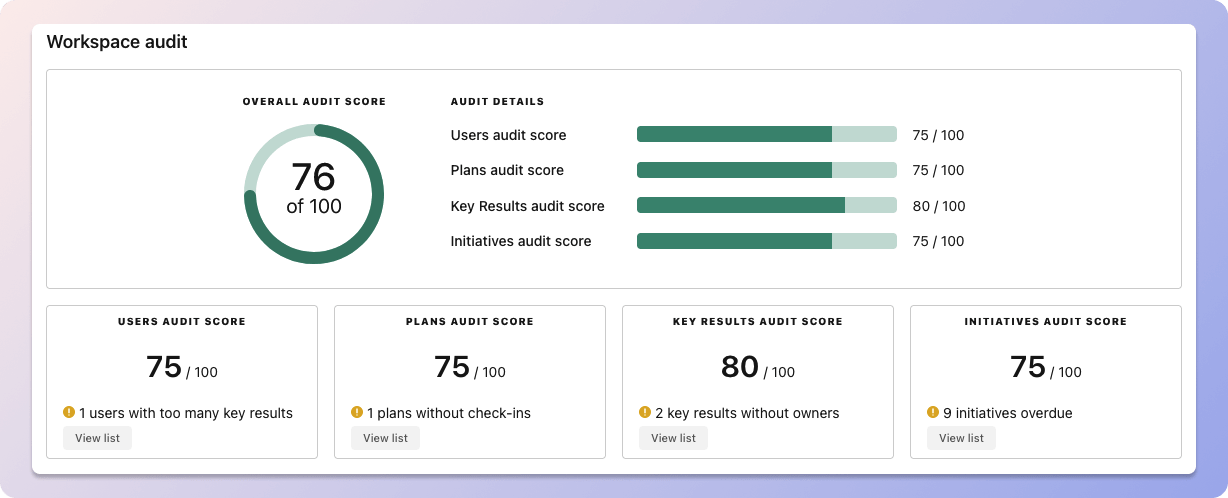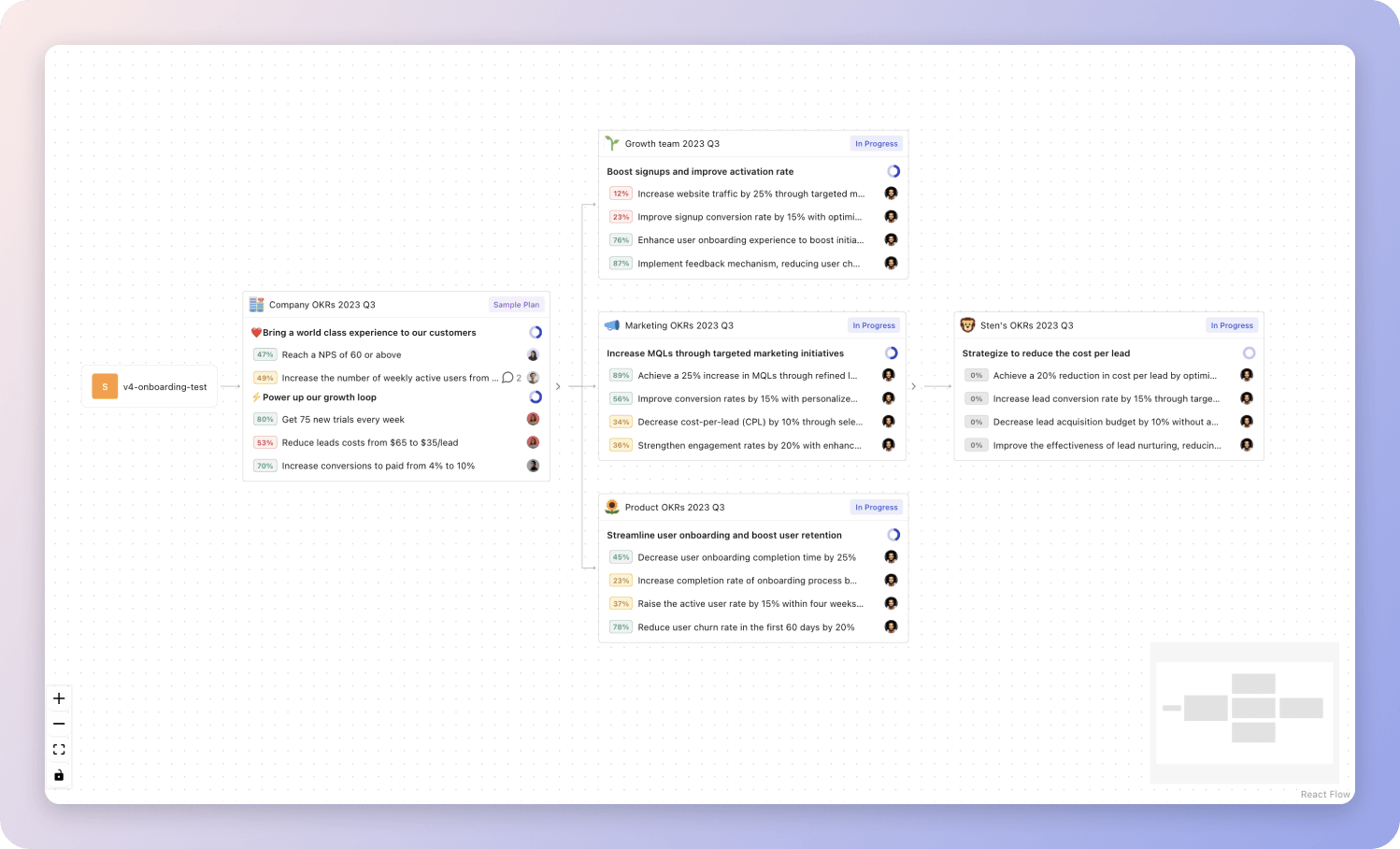5 OKR examples for Maintenance Manager
What are Maintenance Manager OKRs?
The Objective and Key Results (OKR) framework is a simple goal-setting methodology that was introduced at Intel by Andy Grove in the 70s. It became popular after John Doerr introduced it to Google in the 90s, and it's now used by teams of all sizes to set and track ambitious goals at scale.
How you write your OKRs can make a huge difference on the impact that your team will have at the end of the quarter. But, it's not always easy to write a quarterly plan that focuses on outcomes instead of projects.
That's why we have created a list of OKRs examples for Maintenance Manager to help. You can use any of the templates below as a starting point to write your own goals.
If you want to learn more about the framework, you can read more about the OKR meaning online.
Best practices for managing your Maintenance Manager OKRs
Generally speaking, your objectives should be ambitious yet achievable, and your key results should be measurable and time-bound (using the SMART framework can be helpful). It is also recommended to list strategic initiatives under your key results, as it'll help you avoid the common mistake of listing projects in your KRs.
Here are a couple of best practices extracted from our OKR implementation guide 👇
Tip #1: Limit the number of key results
Focus can only be achieve by limiting the number of competing priorities. It is crucial that you take the time to identify where you need to move the needle, and avoid adding business-as-usual activities to your OKRs.
We recommend having 3-4 objectives, and 3-4 key results per objective. A platform like Tability can run audits on your data to help you identify the plans that have too many goals.
 Tability's audit dashboard will highlight opportunities to improve OKRs
Tability's audit dashboard will highlight opportunities to improve OKRsTip #2: Commit to the weekly check-ins
Having good goals is only half the effort. You'll get significant more value from your OKRs if you commit to a weekly check-in process.
Being able to see trends for your key results will also keep yourself honest.
 Tability's check-ins will save you hours and increase transparency
Tability's check-ins will save you hours and increase transparencyTip #3: No more than 2 yellow statuses in a row
Yes, this is another tip for goal-tracking instead of goal-setting (but you'll get plenty of OKR examples below). But, once you have your goals defined, it will be your ability to keep the right sense of urgency that will make the difference.
As a rule of thumb, it's best to avoid having more than 2 yellow/at risk statuses in a row.
Make a call on the 3rd update. You should be either back on track, or off track. This sounds harsh but it's the best way to signal risks early enough to fix things.
Building your own Maintenance Manager OKRs with AI
While we have some examples below, it's likely that you'll have specific scenarios that aren't covered here. There are 2 options available to you.
- Use our free OKRs generator
- Use Tability, a complete platform to set and track OKRs and initiatives
- including a GPT-4 powered goal generator
Best way to track your Maintenance Manager OKRs
The rules of OKRs are simple. Quarterly OKRs should be tracked weekly, and yearly OKRs should be tracked monthly. Reviewing progress periodically has several advantages:
- It brings the goals back to the top of the mind
- It will highlight poorly set OKRs
- It will surface execution risks
- It improves transparency and accountability
Spreadsheets are enough to get started. Then, once you need to scale you can use a proper OKR platform to make things easier.
 Tability's Strategy Map makes it easy to see all your org's OKRs
Tability's Strategy Map makes it easy to see all your org's OKRsIf you're not yet set on a tool, you can check out the 5 best OKR tracking templates guide to find the best way to monitor progress during the quarter.
Maintenance Manager OKRs templates
We've covered most of the things that you need to know about setting good OKRs and tracking them effectively. It's now time to give you a series of templates that you can use for inspiration!
You'll find below a list of Objectives and Key Results templates for Maintenance Manager. We also included strategic projects for each template to make it easier to understand the difference between key results and projects.
Hope you'll find this helpful!
OKRs to achieve optimal efficiency in engineering operations
Achieve optimal efficiency in engineering operations
Lower engineering error rates by 10% through enhanced quality control measures
Regularly monitor and review error reports
Conduct regular training for quality control measures
Implement rigorous testing protocols for every engineering process
Reduce operation downtime by 20% through improved preventative maintenance procedures
Implement strict equipment servicing and inspection schedules
Develop detailed preventative maintenance protocols
Train personnel in efficient troubleshooting techniques
Increase operational efficiency by 15% via process improvement initiatives
Implement new strategies to streamline processes
Regularly assess and adjust improvements for optimal efficiency
Identify inefficiencies in current operational procedures
OKRs to enhance cashflow maintenance for successful resource provision
Enhance cashflow maintenance for successful resource provision
Increase net income by 20% through new revenue streams
Launch new, cost-effective products or services
Implement innovative marketing strategies to attract new customers
Identify potential markets for product expansion
Ensure 100% punctual resource delivery to increase efficiency and productivity
Implement strict deadlines for resource procurement
Regularly review and optimize delivery processes
Set up automated reminders for delivery times
Reduce unnecessary expenses by 15% to boost available cash
Cancel subscriptions and services not needed
Develop a budget, cutting excess by 15%
Review all expenses to identify areas of unnecessary spending
OKRs to enhance travel efficiency and punctuality
Enhance travel efficiency and punctuality
Reduce average travel time by 30%
Regularly maintain vehicles for optimal performance
Promote off-peak travel times for employees
Implement more efficient route planning software
Decrease travel-related complaints by 40%
Implement employee training on proper travel etiquette
Improve communication about travel policies and procedures
Enhance customer service for travel-related inquiries
Initiate 100% on-time departures
Develop a comprehensive schedule ensuring efficient workflow and timely departures
Implement strict adherence to the schedule by all staff members
Regularly review and adjust the process to improve punctuality performance
OKRs to enhance the efficiency and reliability of IT services
Enhance the efficiency and reliability of IT services
Decrease system downtime by 20%
Implement regular preventive maintenance on all system components
Establish robust disaster recovery and backup plans
Upgrade outdated hardware and software components
Implement proactive maintenance on 95% of servers
Assign a maintenance team to apply the protocol to identified servers
Identify all servers needing proactive maintenance
Develop and document a proactive maintenance protocol
Increase customer satisfaction scores by 15% via improved service delivery
Train staff in advanced customer service techniques
Implement a robust customer feedback system
Streamline service delivery for efficiency
OKRs to improve IT Service Management process efficiency and efficacy
Improve IT Service Management process efficiency and efficacy
Implement two new service improvement projects
Identify areas in the service sector that need improvement
Commence execution of the project plan steps
Develop detailed project plans for improvements
Achieve 95% service request satisfaction
Solicit and incorporate feedback from service users
Regularly train staff to improve quality of customer service
Implement a system for tracking and resolving requests efficiently
Reduce system-related incidents by 20%
Train staff on correct system usage
Implement regular system maintenance and upgrades
Enhance system security measures
More Maintenance Manager OKR templates
We have more templates to help you draft your team goals and OKRs.
OKRs to successfully migrate admin application to existing platform
OKRs to to implement a strategic, consistent, and realistic social media approach
OKRs to successfully patent a new medical device
OKRs to build an amazing user experience
OKRs to accelerate user growth for SaaS product
OKRs to develop AI chat GPT for convention
OKRs resources
Here are a list of resources to help you adopt the Objectives and Key Results framework.
- To learn: Complete 2024 OKR cheat sheet
- Blog posts: ODT Blog
- Success metrics: KPIs examples